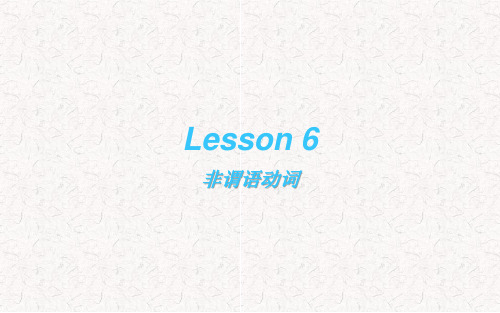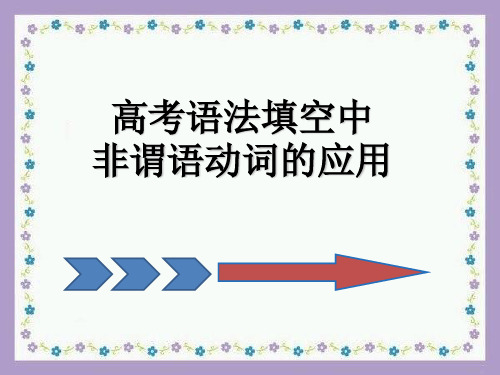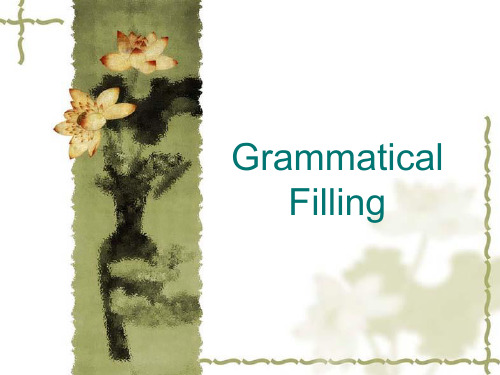高三英语 非谓语动词语法填空专题训练总复习课件
合集下载
高三英语一轮复习语法专题_非谓语动词课件 (共20张PPT)精选课件

next Friday. 2. Today we have chat rooms, text messaging,
emailing… but we seem to be losing the art of communicating face-to-face. 3. He seemed to have been there many times.
高考复习
动名词 重难点一:直接加动名词作宾语的动词。 admit, advise, avoid, appreciate, consider(考虑), delay, deny, enjoy, escape, fancy, finish, feel like, imagine, give up, practise, risk, miss, mind, stand, suggest, put off, resist, cannot help (情不自禁)
高考复习
动词不定式 重难点三:熟记动词用法,带不带to记心间。
+ to do afford/aim/appear/agree/determine/expect/hope/fail/happen manage/offer… + do 使役动词: let/have/make sb. do (主动) 感官动词: see//notice/hear/look at/listen to/ smell/feel/find
tried it on, only _____ it didn’t fit.
A. to find
B. found
C. finding
D. having found
2. He sat in the front, with his eyes _____ on the
emailing… but we seem to be losing the art of communicating face-to-face. 3. He seemed to have been there many times.
高考复习
动名词 重难点一:直接加动名词作宾语的动词。 admit, advise, avoid, appreciate, consider(考虑), delay, deny, enjoy, escape, fancy, finish, feel like, imagine, give up, practise, risk, miss, mind, stand, suggest, put off, resist, cannot help (情不自禁)
高考复习
动词不定式 重难点三:熟记动词用法,带不带to记心间。
+ to do afford/aim/appear/agree/determine/expect/hope/fail/happen manage/offer… + do 使役动词: let/have/make sb. do (主动) 感官动词: see//notice/hear/look at/listen to/ smell/feel/find
tried it on, only _____ it didn’t fit.
A. to find
B. found
C. finding
D. having found
2. He sat in the front, with his eyes _____ on the
高中英语复习 非谓语动词和语法填空 课件(共28张PPT)

1. He hurried to the booking office, only
___t_o_b__e_t_o_l_d__ (tell) that all the tickets had
been sold out.
to do表示结果—表示出人预料的情况或结果, 常用only强调。
2. European football is played in 80 countries,
of fear or guilt.
turn 1. If you _t_u_r_n_to the left , you'll find the post office .
2. _T_u_r_n_to the left , and you'll find the post office . 3. Turning to the left , you'll find the post office .
they were thinking. All ideas, thoughts and
anything that entered their mind had to [9]_b_e__e_x_p_r_e_ss_e_d(express). There could be no[10]_h_o_l_d_i_n_g_(hold)back because
高三语语法复习
Non-predicate Verbs
非谓语动词
【学习目标】
1.能熟练掌握非谓语动词的基本用法;
2.能够在语法填空中正确使用非谓语动 词。
重点 非谓语动词作定语、状语和宾语补足 语的用法
难点 非谓语动词在语法填空中的应用
非谓语动词 的分类
不定式(to do)
高三年级高考语法填空复习课件(共33张PPT)

Tips:非谓语的形式一定要考虑 它与其逻辑主语之间 的关系。
done
在句中充当除谓语以外的 句子成分的动词形式叫做 非谓语动词
不定式 一般式
主动式 to do
被动式
to be done
to be being done
to have been done
进行式
完成式
to be doing
to have done
Tips
:若括号中给出的动词为谓语 动词,考点为时态和语态,时态考虑 要瞻前顾后。
动词 (do-did-done)
1.build 2.bring 3.steal 4.sing 5.blow 6.catch send spend buy fight speak forget drink ring throw know teach lend rebuild think freeze choose begin sink grow fly
Conclusion
提示词
动词时态语态,非谓语动词, 单复数,词性转换,形容词 或副词的比较级或最高级, 主谓一致
介词,连词,代词,冠词, 从句引导词,固定句型短语
无提示词
1.动词考点 1.Young Beethoven ________ was told(tell) that he had no talent for music, but he ________ gave (give) some of the best music to the world.
2.非谓语动词考点
1.He became well known and people would visit to see him just _____________(see)his creation. 2.For example, in the picture book written _______________ (write)by Rania, the author illustrates the friendship. Born 3._________(bear) in London, Greiner graduated from MIT. ter the team saw these the same monkeys living (live) in the wild. ______
高三总复习英语课件 重难语法 非谓语动词

第二组(写作)
1.(2021·全国甲卷) In order to forest students' richer insight into Chinese culture , a class meeting themed introducing Chinese traditional culture to foreign friends will be launched in our school. 为了让学生更深入地了解中国文化,我们学校将推出一个向外国朋友介绍中国 传统文化为主题的课堂会议。
2.(2021·浙江卷)In 1985, urban men and women in more than three quarters of the countries studied (study) had higher BMIs than men and women in rural areas.
2.(2021·全国乙卷)On the one hand, providing an easy access to plenty of excellent learning sources , online learning is really a helping hand.
一方面,提供方便访问大量的优秀学习来源,在线学习确实是一个好帮手。
重难语法 非谓语动词
第一组(语法填空)
1.(2021·浙江卷)This may be due to some disadvantages for people living (live) in the countryside, including lower levels of income and education, higher costs of healthy foods, and fewer sports facilities.
高三英语一轮复习语法专题---非谓语动词 (全)课件(共81张)

paid rode rang rose ran said saw sought sold sent shook shone
paid ridden rung risen
run said seen sought sold sent shaken shone
付款 骑 打电话; 按(铃)
升起 跑 说 看见 寻找 卖 送;发射;派遣 摇头;摇晃 照耀;使发光
drunk
பைடு நூலகம்
建设 燃烧 买 抓;赶上 选择 来 处理 挖掘 做 拖;拉 梦想 喝;饮
26 drive 27 eat 28 fall 29 feed 30 feel 31 fight 32 find 33 fly 34 forbid 35 forget 36 forgive 37 freeze 38 get
粘贴;插入 有用 拿;取
教;教书 撕裂;撕破
告诉 想 投;掷 明白;懂得 醒 穿;戴 赢得;获胜 写
6. 其他 picnic---picnicked --picnicked panic---panicked --- picked
2020/12/28
二、 作主语和表语 1. 动词不定式与动名词作主语的区别 动名词:侧重于一般的、普通的或经常性、习惯性的动作 不定式: 侧重于将来特定的某一次。
76 shoot
77 show
78 sing
79 sink
80
sit
81 sleep
82 slide
83 smell
84 speak
85 speed
86 spell
87 spend
88 stand
89 steal
2020/12/28
shot s h o w ed
高中语法非谓语动词在语法填空中的应用课件(共25张)

2
句型一、二、三
3
主动:doing; 被动:done
THANKS!
高中语法非谓语动词 在语法填空中的应用
授课 对象
高三80-100分 有非谓语基础 应用较为薄弱
授课 目标
巩固分词作状语知 识,提升做题技巧
01
考情分析
分词作状语知识点
02
03
如何解题
总结
04
考情分析
14-18年全国I II III卷各语法点考频
62.5 50
37.5 25
12.5 0 动词 形\副词 名词
The cooling wind swept through our bedroom windows,
conditioning unnecessary.
【16年天津】
(make) air
识别此非谓语作状语
1
句子, (V) +其他
2
(V)+其他 ,句子
3
句子成分, (V)+其他 ,句子成分
真题识别
句型二:
(V) +其他,句子
确认分词形式
主语 与 非谓语动作
主动 被动
doing done
真题识别
真题识别
(shock) , I took it from her automatically.
【15年上海】
被动 Shocked
Newly-built wooden cottages line the street, town into a dreamland.
(wear) sun glasses. 【12广东】
真题识别
Ordinary soap,_________(use)correctly , can deal with bacteria effectively.
高考语法填空非谓语动词的运用精品PPT课件

如果动作正在进行,则用-ing的被动形式。
原主则句五 主原:语则非 保谓 持五语 一:动 致非词 。谓作语状动语词时,作原状则语上时其,逻…辑主语应与 原原则则六:六强:调强动调作动发作生发在生主句在谓主语句动谓作语之动前作,原则上 要用完成式(-ing之的前完时成,式或…不定式的完成式)
原则七:用于名词后作定语,原则是:不定式表示动作
高考语法填空中 非谓语动词的应用
非谓语动词 的分类
不定式(to do)
非
谓
as a noun 动名词
语 V-ing
动
as adj. or adv.
词
现在分词
V-ed 过去分词
非谓语动词的语法功能
主语 宾语 表语 定语 状语 宾补
动
名√
√
√
√
词
不
定√
√
√
√
√
√
式
分
词
√ √√√
非谓语动词的 七大经典原则
尚未发生原;则-in七g表:示用动于作名正词在后进行作:定过语去时分,词…表示动作完
成,被动。
非谓语动词的
使用条件
一个句子当中,已经存在谓语动 词,又没有连词的情况下, 还有别 的动词出现时,这些动词就充当了 非谓语动词.
1.分析句子结构 确定用非谓语动词
2.判断非谓语动词在句中的成分和作用 确定(逻辑主语& 语态)
2._C_o_m__p_a__re_d_ with other top students, you are better.
discuss
(1)The question _b_e_in__g_d_i_s_cu__ss_e_d____now at the meeting is very important. (2)The question d_i_s_c_u_ss_e_d_ at the meeting last week is very important. (3)The question _t_o_b_e__d_is_c_u_s_s_ed______ at the meeting next week is very important.
原主则句五 主原:语则非 保谓 持五语 一:动 致非词 。谓作语状动语词时,作原状则语上时其,逻…辑主语应与 原原则则六:六强:调强动调作动发作生发在生主句在谓主语句动谓作语之动前作,原则上 要用完成式(-ing之的前完时成,式或…不定式的完成式)
原则七:用于名词后作定语,原则是:不定式表示动作
高考语法填空中 非谓语动词的应用
非谓语动词 的分类
不定式(to do)
非
谓
as a noun 动名词
语 V-ing
动
as adj. or adv.
词
现在分词
V-ed 过去分词
非谓语动词的语法功能
主语 宾语 表语 定语 状语 宾补
动
名√
√
√
√
词
不
定√
√
√
√
√
√
式
分
词
√ √√√
非谓语动词的 七大经典原则
尚未发生原;则-in七g表:示用动于作名正词在后进行作:定过语去时分,词…表示动作完
成,被动。
非谓语动词的
使用条件
一个句子当中,已经存在谓语动 词,又没有连词的情况下, 还有别 的动词出现时,这些动词就充当了 非谓语动词.
1.分析句子结构 确定用非谓语动词
2.判断非谓语动词在句中的成分和作用 确定(逻辑主语& 语态)
2._C_o_m__p_a__re_d_ with other top students, you are better.
discuss
(1)The question _b_e_in__g_d_i_s_cu__ss_e_d____now at the meeting is very important. (2)The question d_i_s_c_u_ss_e_d_ at the meeting last week is very important. (3)The question _t_o_b_e__d_is_c_u_s_s_ed______ at the meeting next week is very important.
高三英语复习公开课:语法填空 课件(共28张PPT)

1、The nursery team switches him every few _d_a_y_s__(day) with his sister.
2、Have you ever read _t_o_d_a_y_’s__(today) newspaper?
3、Wearing the wrong type of glasses will do harm to __y_o_u_r___(you) eyes.
2、Finally, that hard work paid off and now the water in the river is _c_le_a_n_e_r_(clean) than ever.
2、考查词类转换 所给提示词是形容词时,还需要考虑形容词转 化为副词或名词。
1、The exam was _p_a_r_t_ic_u_l_a_rl_y__ (particular) important because he knew his future career might be at stake.
2、Facial expression and body language can __g__re_a_t_ly___(great) affect a conversation.
Exercise 2
1、Before I got on the bike, I felt __e_x_tr_e_m__e_ly_ (extreme) nervous.
2、冠词 如果空格后有名词而且两者搭配在一起表示泛指或 特指含义,或者有序数词、最高级、表示特指意义的 比较级等形式,那么空格处一般是填冠词。 1、In that case, we will learn little about __t_h_e__ world.
2、Have you ever read _t_o_d_a_y_’s__(today) newspaper?
3、Wearing the wrong type of glasses will do harm to __y_o_u_r___(you) eyes.
2、Finally, that hard work paid off and now the water in the river is _c_le_a_n_e_r_(clean) than ever.
2、考查词类转换 所给提示词是形容词时,还需要考虑形容词转 化为副词或名词。
1、The exam was _p_a_r_t_ic_u_l_a_rl_y__ (particular) important because he knew his future career might be at stake.
2、Facial expression and body language can __g__re_a_t_ly___(great) affect a conversation.
Exercise 2
1、Before I got on the bike, I felt __e_x_tr_e_m__e_ly_ (extreme) nervous.
2、冠词 如果空格后有名词而且两者搭配在一起表示泛指或 特指含义,或者有序数词、最高级、表示特指意义的 比较级等形式,那么空格处一般是填冠词。 1、In that case, we will learn little about __t_h_e__ world.
- 1、下载文档前请自行甄别文档内容的完整性,平台不提供额外的编辑、内容补充、找答案等附加服务。
- 2、"仅部分预览"的文档,不可在线预览部分如存在完整性等问题,可反馈申请退款(可完整预览的文档不适用该条件!)。
- 3、如文档侵犯您的权益,请联系客服反馈,我们会尽快为您处理(人工客服工作时间:9:00-18:30)。
opinions. It’s no use _a_r_g_u__in__g__(argue) with him.
(上海)
3. Please remain __s_e_a_te_d___(seat); the winner of
the prize will be announced soon. (辽宁)
[例2] While she was getting me ___34___ (settle) into a tiny but clean room…(2007年广东)
分析:因句中已有谓语was getting,所以 settle应是非谓语动词;又由settle sb. into/in/on…(使某人舒服地处于某处)可知, me与settle是被动关系,要用过去分词用宾 语 (1)动词不定式作定语:常放在所修饰的名词 之后,表示一个将来的动作,多用来修饰have、 there be、with之后的名词,表示“有…… 要……”;或修饰“the+序数词”。
(2)分词作定语:被修饰的名词与分词是主动 关系,用-ing形式,是被动关系时用-ed形式。
考点7:特殊句式 Why not do sth.? =Why don’t you do sth.?何不做某事呢?
have a hard time in doing sth.做某事很艰难 there is no sense in doing做……是没有理由/ 道理的
(7)介词后一般只能接动名词,但在表示 “除……外”的介词but和except后,有时可 接不定式;当前面有行为动词do时,不定式 不带to;前面没有行为动词do时,要带to。
考点4:作宾补 当宾语与作宾补的动词在逻辑上是主动关系 时,用不定式(未来或全过程)或-ing形式(正在 进行或一直处于某种状态); 当宾语与作宾补的动词在逻辑上是被动关系 时,用-ed形式。
请注意复习以下6点: (1)在ask, invite, encourage, advise, forbid, remind等动词后,用带to的不定式作宾补。 (2)在help后作宾补的不定式带不带to均可。
had better (not) do sth.最好(不)做某事
would rather (not) do sth.宁愿(不)做某事 would do A rather than do B = would rather do A than do B = prefer to do A rather than do B = prefer doing A to doing B
— Oh, yes. How often I have regretted
__n_o_t__ta_k__in__g_(not take) his advice! (安徽)
10. If you think that treating a woman well
means always _g_e_t_ti_n_g__ (get) her permission for
6. I can’t stand _w_o_r_k__in__g_(work) with Jane in the same office. She just refuses _t_o__s_to__p_(stop)
talking while she works. (北京)
7. As a result of the serious flood, two-thirds of the buildings in the area need _to__b_e_r_e_p_a_i_r_e_d_ (repair). (陕西)
高三英语总复习语法填空专题训练课件:非谓语动词
非谓语动词
非谓语动词是语法填空的必考考点, 每年高考至少有1道题。不仅如此,掌 握非谓语动词的基本用法,对增强书面 表达的文采和提高阅读理解能力都有明 显的作用。
首先,我们回顾一下非谓语动词的语 法功能(在句中充当何种成分):
主语
宾语
表语
定语
状语
宾补
宁做A事不做B事
考点8:独立结构 (1) -ing形式的独立成分:judging by /from(根据…判断), generally speaking(一般 说来),strictly speaking(严格说来), frankly speaking(坦率地说)等。 (2)不定式的独立结构:to tell you the truth(和你说实话吧), to make things worse(情况更糟的是)等。 (3)用作介词或连词的considering(考虑到, 就…而言)和given(考虑到)后接名词或that从 句。
动名词 √
√
√
√
不定式 √
√
√
√
√
√
分词
√
√
√
√
现在,我们简要回顾其主要考点:
考点1:作主语 表示一般的、泛指的或习惯性的行为用-ing; 表示具体的、一次性的或将来的动作用to do 。 考点2:作表语 (1) 动名词和不定式作表语说明主语的具体内 容。
(2)分词作表语则说明主语的性质,像puzzling, surprising, exciting等-ing分词表示“令人…… 的(事物)”;像puzzled, surprised, excited等-ed 分词表示“(人)感到……的”。
(3)在make, let, have等使役动词和feel, smell, hear, see, watch等感官动词后,一般用不带to
的不定式作宾补,但在其被动式后作主语补足 语时,要加上to。 (4)在with的宾语后,若用-ed形式,表示宾语与 -ed形式在逻辑上是被动关系,且意味着该动作 已经完成;若用-ing形式,表示宾语与-ing形式 在逻辑上是主动关系,且表示动作持续进行。
(5)get sb. to do sth. =have sb. do sth.使某人做某 事(主动、将来); get/have…doing使……处于某一 状态中(主动、持续); get…done=have sth. done请 人做/遭受(被动)。
(6) make oneself 后常用understood, heard, seen, known等作宾补,表示让别人明白自己的意思/让 自己讲的话被别人听到/让自己被别人看到/让自 己被别人认识。
考点3:作宾语 (1)有些动词只能用不定式作宾语。如refuse, expect, promise, decide, offer, pretend等。(类 似动词和短语动词还有哪些?请补上) (2)有些动词只能用动名词作宾语。如:keep,
allow, finish, enjoy, mind, practice, avoid,
而产生的自然结果(同时发生),谓语动词与现在分 词的动作是因果关系。
(4)在作表语的形容词后或者作宾补的 形容词后作状语,一般只用不定式。
(5)表示目的时只能用不定式,此时的 不定式可以放在句首。
(6) 在“连词(如when, while, if, though 等)+分词”结构中,当分词与主句主语 是主动关系时用-ing形式,是被动关系时 用-ed形式。
4. — Can I smoke here?
— Sorry. We don’t allow __sm__o_k__in__g__(smoke)
here. (江苏)
5. It is difficult to imagine his _a_c_c_e_p_t_in_g
(accept) the decision without any consideration. (陕西)
admit, advise, consider, imagine, appreciate, escape, suggest等。(类似动词和短语动词还有 哪些?请补上)
(3) 在表示“需要”的need, want和require等 后用-ing形式的主动形式表示被动意义,也可 用不定式的被动式。
(4)在forget, remember, regret, mean, try等 动词后既可接动名词,也可接不定式,但意 义差别较大。
8. Susan wanted to be independent of her
parents. She tried __li_v_i_n_g__ (live) alone, but she
didn’t like it and moved back home. (湖南)
9. — Robert is indeed a wise man.
[例1]…the proverb, “plucking up a crop 32 (help) it grow”, is based on the following story.
(2008年广东)
分析:因句中已有谓语is based,而“plucking up a crop 32 (help) it grow”是the proverb 的同位语,是一个名词短语而非同位语从句, 因此,help应是非谓语动词;“帮助禾苗长” 是“将禾苗拨起来”的目的,作目的状语,用 动词不定式,故填to help。
(6)含介词的固定句式: prevent /stop /keep sb. /sth. from doing 阻 止……做……
spend /waste time or money in doing 在 做……方面花费/浪费时间或金钱
have some difficulty/trouble in doing 在 做……方面有些困难
(5)在介词之后用动名词作宾语。注意to是介 词的短语,如be /get used to, be accustomed to(习惯于), contribute … to …, devote oneself
to /be devoted to, get down to, look forward to 等。
(上海)
3. Please remain __s_e_a_te_d___(seat); the winner of
the prize will be announced soon. (辽宁)
[例2] While she was getting me ___34___ (settle) into a tiny but clean room…(2007年广东)
分析:因句中已有谓语was getting,所以 settle应是非谓语动词;又由settle sb. into/in/on…(使某人舒服地处于某处)可知, me与settle是被动关系,要用过去分词用宾 语 (1)动词不定式作定语:常放在所修饰的名词 之后,表示一个将来的动作,多用来修饰have、 there be、with之后的名词,表示“有…… 要……”;或修饰“the+序数词”。
(2)分词作定语:被修饰的名词与分词是主动 关系,用-ing形式,是被动关系时用-ed形式。
考点7:特殊句式 Why not do sth.? =Why don’t you do sth.?何不做某事呢?
have a hard time in doing sth.做某事很艰难 there is no sense in doing做……是没有理由/ 道理的
(7)介词后一般只能接动名词,但在表示 “除……外”的介词but和except后,有时可 接不定式;当前面有行为动词do时,不定式 不带to;前面没有行为动词do时,要带to。
考点4:作宾补 当宾语与作宾补的动词在逻辑上是主动关系 时,用不定式(未来或全过程)或-ing形式(正在 进行或一直处于某种状态); 当宾语与作宾补的动词在逻辑上是被动关系 时,用-ed形式。
请注意复习以下6点: (1)在ask, invite, encourage, advise, forbid, remind等动词后,用带to的不定式作宾补。 (2)在help后作宾补的不定式带不带to均可。
had better (not) do sth.最好(不)做某事
would rather (not) do sth.宁愿(不)做某事 would do A rather than do B = would rather do A than do B = prefer to do A rather than do B = prefer doing A to doing B
— Oh, yes. How often I have regretted
__n_o_t__ta_k__in__g_(not take) his advice! (安徽)
10. If you think that treating a woman well
means always _g_e_t_ti_n_g__ (get) her permission for
6. I can’t stand _w_o_r_k__in__g_(work) with Jane in the same office. She just refuses _t_o__s_to__p_(stop)
talking while she works. (北京)
7. As a result of the serious flood, two-thirds of the buildings in the area need _to__b_e_r_e_p_a_i_r_e_d_ (repair). (陕西)
高三英语总复习语法填空专题训练课件:非谓语动词
非谓语动词
非谓语动词是语法填空的必考考点, 每年高考至少有1道题。不仅如此,掌 握非谓语动词的基本用法,对增强书面 表达的文采和提高阅读理解能力都有明 显的作用。
首先,我们回顾一下非谓语动词的语 法功能(在句中充当何种成分):
主语
宾语
表语
定语
状语
宾补
宁做A事不做B事
考点8:独立结构 (1) -ing形式的独立成分:judging by /from(根据…判断), generally speaking(一般 说来),strictly speaking(严格说来), frankly speaking(坦率地说)等。 (2)不定式的独立结构:to tell you the truth(和你说实话吧), to make things worse(情况更糟的是)等。 (3)用作介词或连词的considering(考虑到, 就…而言)和given(考虑到)后接名词或that从 句。
动名词 √
√
√
√
不定式 √
√
√
√
√
√
分词
√
√
√
√
现在,我们简要回顾其主要考点:
考点1:作主语 表示一般的、泛指的或习惯性的行为用-ing; 表示具体的、一次性的或将来的动作用to do 。 考点2:作表语 (1) 动名词和不定式作表语说明主语的具体内 容。
(2)分词作表语则说明主语的性质,像puzzling, surprising, exciting等-ing分词表示“令人…… 的(事物)”;像puzzled, surprised, excited等-ed 分词表示“(人)感到……的”。
(3)在make, let, have等使役动词和feel, smell, hear, see, watch等感官动词后,一般用不带to
的不定式作宾补,但在其被动式后作主语补足 语时,要加上to。 (4)在with的宾语后,若用-ed形式,表示宾语与 -ed形式在逻辑上是被动关系,且意味着该动作 已经完成;若用-ing形式,表示宾语与-ing形式 在逻辑上是主动关系,且表示动作持续进行。
(5)get sb. to do sth. =have sb. do sth.使某人做某 事(主动、将来); get/have…doing使……处于某一 状态中(主动、持续); get…done=have sth. done请 人做/遭受(被动)。
(6) make oneself 后常用understood, heard, seen, known等作宾补,表示让别人明白自己的意思/让 自己讲的话被别人听到/让自己被别人看到/让自 己被别人认识。
考点3:作宾语 (1)有些动词只能用不定式作宾语。如refuse, expect, promise, decide, offer, pretend等。(类 似动词和短语动词还有哪些?请补上) (2)有些动词只能用动名词作宾语。如:keep,
allow, finish, enjoy, mind, practice, avoid,
而产生的自然结果(同时发生),谓语动词与现在分 词的动作是因果关系。
(4)在作表语的形容词后或者作宾补的 形容词后作状语,一般只用不定式。
(5)表示目的时只能用不定式,此时的 不定式可以放在句首。
(6) 在“连词(如when, while, if, though 等)+分词”结构中,当分词与主句主语 是主动关系时用-ing形式,是被动关系时 用-ed形式。
4. — Can I smoke here?
— Sorry. We don’t allow __sm__o_k__in__g__(smoke)
here. (江苏)
5. It is difficult to imagine his _a_c_c_e_p_t_in_g
(accept) the decision without any consideration. (陕西)
admit, advise, consider, imagine, appreciate, escape, suggest等。(类似动词和短语动词还有 哪些?请补上)
(3) 在表示“需要”的need, want和require等 后用-ing形式的主动形式表示被动意义,也可 用不定式的被动式。
(4)在forget, remember, regret, mean, try等 动词后既可接动名词,也可接不定式,但意 义差别较大。
8. Susan wanted to be independent of her
parents. She tried __li_v_i_n_g__ (live) alone, but she
didn’t like it and moved back home. (湖南)
9. — Robert is indeed a wise man.
[例1]…the proverb, “plucking up a crop 32 (help) it grow”, is based on the following story.
(2008年广东)
分析:因句中已有谓语is based,而“plucking up a crop 32 (help) it grow”是the proverb 的同位语,是一个名词短语而非同位语从句, 因此,help应是非谓语动词;“帮助禾苗长” 是“将禾苗拨起来”的目的,作目的状语,用 动词不定式,故填to help。
(6)含介词的固定句式: prevent /stop /keep sb. /sth. from doing 阻 止……做……
spend /waste time or money in doing 在 做……方面花费/浪费时间或金钱
have some difficulty/trouble in doing 在 做……方面有些困难
(5)在介词之后用动名词作宾语。注意to是介 词的短语,如be /get used to, be accustomed to(习惯于), contribute … to …, devote oneself
to /be devoted to, get down to, look forward to 等。
